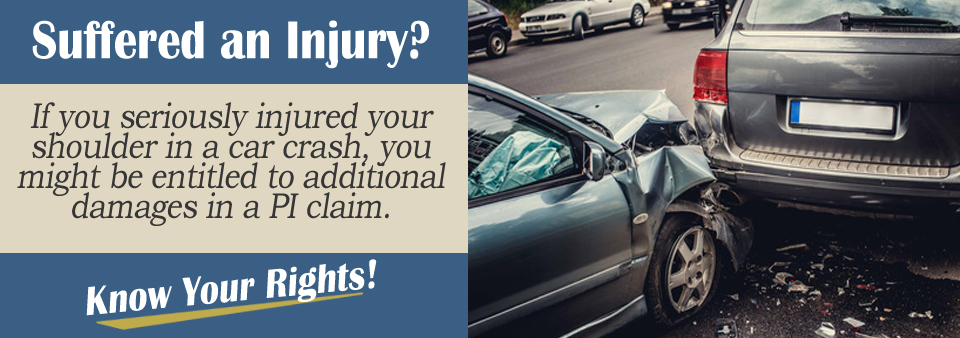Shoulder injuries can be very painful and they can end up causing permanent damage. Nerve damage, limited range of motion, and other problems can all be caused by shoulder injuries from a car accident.
If you have a painful shoulder injury that was the result of a car accident caused by another driver you may eligible to file a personal injury claim against that driver. A personal injury claim can give you the money that you need to get the right treatment for your shoulder injury, even if you need a lot of therapy or even surgery to correct the problem. Medical bills are covered when you have a successful personal injury claim. Talk with an experienced personal injury today to find out if you can file a personal injury claim.
We have asked attorney, Alaina Sullivan, about what you should do. Here is what she had to say:
Type of Shoulder Injury Involved
There are a variety of types of shoulder injuries, each with different severity level and treatment required. Your normal injury stemming from a car accident is muscle-related or one associated with the tendons and ligaments. When a bone is involved, the level of care and treatment involved increases as well as the permanence of the injury.

Two different types of shoulder injuries exist: instability and impingement. Injuries that fall in the “instability” category are ones where the shoulder joints are out of alignment. This shift in alignment is quite painful when someone tries to lift their arm, and for many, when they do lift their arm, it can feel as if their shoulder is slipping out of place.
Impingement injuries are ones where the shoulder muscles are rubbing against the top of the shoulder blade. Impingement injuries typically come from repetitive overhead arm movements.
Treatment Needed and Possibility of Permanent Disability
A serious injury can involve:
Juries are more likely to award higher damages to someone whose life has been forever altered in this manner. Injuries that are still serious but not as severe as this, such as when you have torn a rotator cuff, are still extremely painful, though they require arthroscopic surgery normally.
You still have a likelihood of future pain, suffering or disability, however. When you have no fractures and it is not obvious you have any rotator cuff injury, your treatment is not quite as significant as the other injuries, and you may have a smaller chance of permanent pain or disability. In those situations, juries may be less likely to award as high of damages.
Determining Value of the Case
You are normally looking at a jury evaluating how much your case is worth should you proceed to trial. A lot can go into what determines your case value, but two major factors tend to be the severity of the injury and how likely the jury is to find that the defendant is liable for these injuries.
Estimating a Plaintiff’s Damages
How has the plaintiff been damaged? Is he or she now saddled with medical bills because of surgeries and treatments that resulted from shoulder injuries? Were wages lost because that person had to be absent from work for an extended period?
These types of damages tend to be easier to prove and are known as concrete damages that need to be shown before being compensated.
Another important question is to ask is how the plaintiff’s quality of life has been altered? Was the plaintiff an active person who played sports, hiked, camped, etc.? Will he or she now no longer be able to enjoy these activities because of their injury? Will he or she ever be able to hold a job again or will that person be permanently on disability?
These less concrete factors also are considered when estimating the damages faced by a plaintiff.
Will the Defendant be Found Liable?
You cannot just assume the jury will automatically find that the defendant is liable for your injuries. Plaintiffs still have the burden of proof in showing causation of their injuries being a direct result of defendant’s conduct. Just because it seems obvious to you does not mean that it is obvious to the jury. Do not underestimate this burden when proving your case.
Contact an Attorney Today
A licensed personal injury attorney will be able to evaluate your case and determine if you have a claim against the other party’s insurance company. For the best chance of receiving the compensation you need to pay for medical bills, auto body bills, and pain and suffering, you should speak with a personal injury attorney in your area today.